Related Research Articles
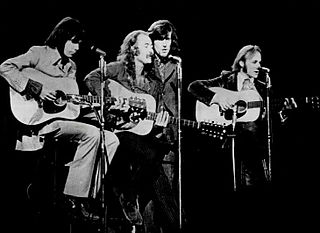
Crosby, Stills & Nash (CSN) was a folk-rock supergroup made up of the American singer-songwriters David Crosby and Stephen Stills and the English singer-songwriter Graham Nash. When joined by the Canadian singer-songwriter Neil Young as a fourth member, they were called Crosby, Stills, Nash & Young (CSNY). They are noted for their intricate vocal harmonies and lasting influence on American music and culture, as well as their political activism and often tumultuous interpersonal relationships.

Stephen Arthur Stills is an American musician, singer, and songwriter best known for his work with Buffalo Springfield, Crosby, Stills & Nash, and Manassas. As both a solo act and member of three successful bands, Stills has combined record sales of over 35 million albums. He was ranked number 28 in Rolling Stone's 2003 list of "The 100 Greatest Guitarists of All Time" and number 47 in the 2011 list. Stills became the first person to be inducted twice on the same night into the Rock and Roll Hall of Fame. According to Neil Young, "Stephen is a genius".
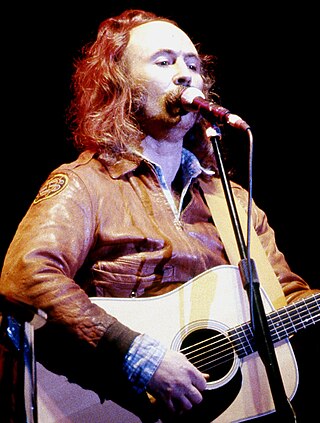
David Van Cortlandt Crosby was an American singer, songwriter, and guitarist. He first found fame as a member of the Byrds, with whom he helped pioneer the genres of folk rock and psychedelia in the mid-1960s, and later as part of the supergroup Crosby, Stills & Nash, who helped popularize the California sound of the 1970s. In addition to his music, Crosby was known for his outspoken personality, politics, and personal troubles; he was sometimes depicted as emblematic of the counterculture of the 1960s.

After the Gold Rush is the third studio album by the Canadian-American musician Neil Young, released in September 1970 on Reprise Records. It's one of four high-profile solo albums released by members of folk rock group Crosby, Stills, Nash & Young in the wake of their chart-topping 1970 album Déjà Vu. Young's album consists mainly of country folk music along with several rock tracks, including "Southern Man." The material was inspired by the unproduced Dean Stockwell-Herb Bermann screenplay After the Gold Rush.

Déjà Vu is the second studio album by the American folk rock group Crosby, Stills & Nash, and their first as a quartet with the addition of Neil Young. It was released in March 1970 by Atlantic Records. It topped the pop album chart for one week and generated three Top 40 singles: "Woodstock", "Teach Your Children", and "Our House". It was re-released in 1977 and an expanded edition was released in 2021 to mark its fiftieth anniversary.
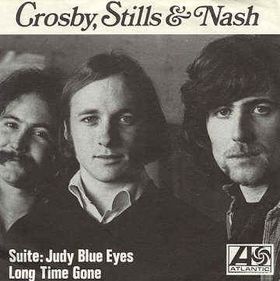
"Suite: Judy Blue Eyes" is a song written by Stephen Stills and performed by Crosby, Stills & Nash (CSN). It appeared on the group's self-titled debut album in 1969 and was released as a single, reaching number 21 on the Billboard Hot 100 pop singles chart. In Canada, "Suite: Judy Blue Eyes" peaked at number 11. The song imitates the form of a classical music suite as an ordered set of musical pieces.

Crosby, Stills & Nash is the debut studio album by the folk rock supergroup Crosby, Stills & Nash (CSN), released in 1969 by Atlantic Records. It is the only release by the band prior to adding Neil Young to their lineup. The album spawned two Top 40 singles, "Marrakesh Express" and "Suite: Judy Blue Eyes", which peaked respectively at No. 28 during the week of August 23, 1969, and at No. 21 during the week of December 6, 1969, on the US Billboard Hot 100. The album itself peaked at No. 6 on the US Billboard Top Pop Albums chart. It has been certified four times platinum by the RIAA for sales of 4,000,000.

CSN is the third studio album by Crosby, Stills & Nash, released on Atlantic Records on June 17, 1977. It is the group's second studio release in the trio configuration. It peaked at No. 2 on the Billboard Top Pop Albums chart; two singles taken from the album, Nash's "Just a Song Before I Go" and Stills' "Fair Game" charted on the Billboard Hot 100. It is currently the trio configuration's best selling record, outselling 1969's Crosby, Stills & Nash by 200,000 copies. It has been certified quadruple platinum by RIAA.
"Wooden Ships" is a song written and composed by David Crosby, Paul Kantner, and Stephen Stills, of which versions were eventually recorded both by Crosby, Stills & Nash and by Kantner with Jefferson Airplane. It was written and composed in 1968 in Fort Lauderdale, Florida, on a boat named the Mayan, owned by Crosby, who composed the music, while Kantner and Stills wrote most of the lyrics.
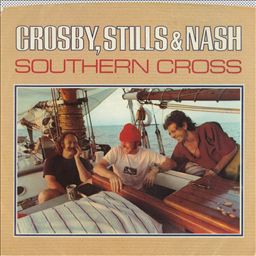
"Southern Cross" is a song written by Stephen Stills, Rick Curtis, and Michael Curtis and performed by the rock band Crosby, Stills & Nash. It was featured on the band's Daylight Again album and was released as a single in September 1982. Stephen Stills sings lead throughout, with Graham Nash joining on the second verse. Because David Crosby did not reunite with Stills and Nash until the album was well underway, his vocals are not featured on the album version, although he did appear in the video and subsequently sang the song with the group in live performances. The single was a success on the charts, reaching No. 18 on the Billboard Hot 100 for three weeks in late November and early December 1982. As of 2022, it was the group's final hit in the Billboard Top 40.

So Far is a compilation album by Crosby, Stills & Nash, and their third as Crosby, Stills, Nash & Young. Shipping as a gold record and peaking at No. 1 on the Billboard Top Pop Albums chart, it was the band's third chart-topping album in a row. It has been certified six times platinum by the RIAA, and is the second best-selling album by any configuration of the quartet in tandem after their 1970 studio album, Déjà Vu.

If I Could Only Remember My Name is the debut solo album by American singer-songwriter David Crosby, released on February 22, 1971, by Atlantic Records. It was one of four high-profile albums released by each member of Crosby, Stills, Nash & Young in the wake of their chart-topping 1970 album Déjà Vu. Guests on the album include Jerry Garcia, Graham Nash, Neil Young, Joni Mitchell, and other prominent West Coast musicians of the era.

Crosby & Nash were a musical duo that maintained a separate career in addition to the solo endeavors of David Crosby and Graham Nash, and separate from the larger aggregate of Crosby, Stills, Nash & Young. Crosby and Nash performed and recorded regularly during the 1970s, issuing five albums including three of original studio material. After the more or less permanent reformation of Crosby, Stills & Nash in 1976, the duo continued to play sporadic concerts from the 1980s through the second decade of the 21st century, issuing another studio album in 2004 and going on an extended concert tour in 2011.
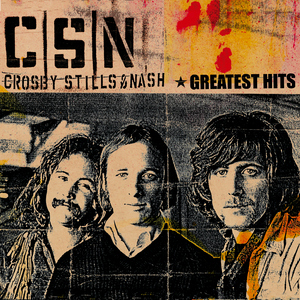
Greatest Hits is a compilation album by Crosby, Stills & Nash, released by Rhino Records in 2005. It peaked at No. 24 on the Billboard 200, debuting at that position on April 2, 2005 with first week sales of 33,000 copies, and spending eight weeks on the chart. Its current sales sit at over 640,000. The album was dedicated to Cass Elliot with great thanks to Neil Young.

"Just a Song Before I Go" is a song by Crosby, Stills and Nash that appeared on the 1977 album CSN. It was also released as a single and reached number 7 on the Billboard Hot 100 for two consecutive weeks ending August 27 and September 3, 1977, becoming the band's highest-charting hit. It is also one of the band's shortest songs, with a running time of only 2:14. In Canada, it peaked at number 10.

Voyage is a 3-CD box set by David Crosby. It features highlights from his career as a solo artist and with groups including The Byrds, various permutations of CSN&Y, and CPR. The tracks are arranged in general chronological order of release. One full disc is devoted to previously unreleased material, mainly acoustic demos.

"Teach Your Children" is a song written by Graham Nash in 1968 when he was a member of the Hollies. Although it was never recorded by that group in a studio, the Hollies did record it live in 1983. After the song was initially recorded for the album Crosby, Stills & Nash in 1969, a much more enhanced version of the song was recorded for the album Déjà Vu by Crosby, Stills, Nash & Young, released in 1970. As a single, the song peaked at No. 16 on the Billboard Hot 100 charts that year. On the Easy Listening chart, it peaked at No. 28. In Canada, "Teach Your Children" reached No. 8. Reviewing the song, Cash Box commented on the "incredible soft harmony luster" and "delicately composed material." Billboard called it "a smooth country-flavored ballad that should prove an even bigger hit on the charts [than 'Woodstock']." Stephen Stills gave the song its "country swing", replacing the "Henry VIII" style of Nash's original demo.

"Carry On" is a song by American folk rock band Crosby, Stills, Nash & Young. Written by Stephen Stills, it is the opening track to their second album Déjà Vu (1970). It was released as the B-side of "Teach Your Children", but went on to receive steady airplay of its own from AOR radio stations.
"Country Girl" is a song written by Neil Young that was first released on Crosby, Stills, Nash & Young's 1970 album Déjà Vu.
These tours were the third tours as the trio of Crosby, Stills & Nash, without Neil Young. They were in support of the 1982 album Daylight Again, and the 1983 live album Allies.
References
- ↑ Liner notes for Voyage, disk 3
- ↑ Greene, Andy (August 18, 2008). "Track by Track: Crosby, Stills & Nash on Their Self-Titled Debut". Rolling Stone . Retrieved August 11, 2018.
- ↑ Christgau, Robert (1981). Christgau's Record Guide: Rock Albums of the '70s. Da Capo Press. p. 102. ISBN 0306804093.
- ↑ "CSN Box Set Tracklist".
- ↑ "Inside the LC: Part XIII". Archived from the original on 2015-04-11. Retrieved 2015-04-11.
- ↑ "Episode 751 - David Crosby". 17 October 2016.
- ↑ "Tweet by David Crosby". Twitter. Retrieved 2020-09-20.